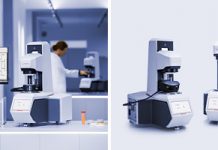Materials developed by Xampla are the first to be identified via spectroscopy and microscopy as plastic-free, laying the groundwork for internationally recognised future standards.
Xampla and the National Physical Laboratory (NPL) have developed a pioneering test to validate the company’s claim that its Morro™ materials – made from natural plant polymers – are plastic-free and SUPD-exempt. Read the full case study here.
A spokesperson says the breakthrough provides assurances that the materials meet tightening UK and EU regulations on single-use plastics, while also establishing a first-of-its-kind validation method for plastic-free claims.
There is currently no universally accepted method for verifying that a material is plastic-free, despite increasing regulatory pressure to eliminate single-use plastics.
With increasing demand for ‘greener’ packaging substitutes, Xampla partnered with NPL through the institution’s Measurement for Business (M4B) programme to develop a way of verifying plastic-free claims.
The EU’s REACH regulation defines plastics as “polymers to which additives or other substances have been added” and highlights that natural polymers which have not been chemically modified are not plastics.
NPL scientists used advanced spectroscopy & high-resolution microscopy to compare the chemical and physical signatures of Morro’s natural polymers before and after processing.
The results showed no meaningful chemical changes, confirming that the materials are not chemically modified, are therefore not plastic according to the EU REACH definition, and are SUPD-exempt.
Many consumers are unaware that common household paper and cardboard packaging often contain a thin plastic coating, making it unrecyclable.
Xampla says its Morro™ line of coatings and films, while offering comparable grease and water resistance to plastic, are made only from natural polymers derived from plants.
The company claims the materials are biodegradable, home compostable, and compatible with existing recycling infrastructure – and also, critically, designed to be plastic-free.
Dr Marc Rodriguez Garcia, co-founder and CTO, Xampla, said: “Given the rapid pace of regulatory change, packaging companies desperately need credible assurance about any plastic-free product they buy.
“We hope this approach — the first of its kind as far as we know — can now be replicated by others to support plastic-free innovation more broadly
“For Xampla, this work with NPL conclusively proves that our Morro materials are plastic-free at a chemical level and so meet existing regulations.”
According to Smithers1, the market for functional and barrier coatings for paper and board is projected to reach 4.25 million tonnes, worth nearly $11 billion, by 2028. Xampla aims to replace 10 billion items of single-use plastic with its Morro materials over the next five years.
Professor Max Ryadnov, NPL Fellow, said: “Eventually, this work could lead to the development of standards to support plastic-free materials and processes used to manufacture them. Such standards will provide manufacturers and regulators with clear and internationally recognised benchmarks against which plastic-free claims can be verified.”









